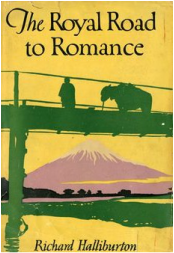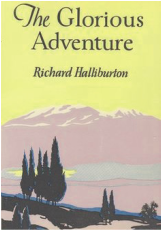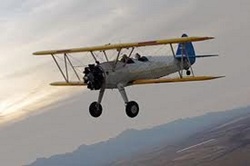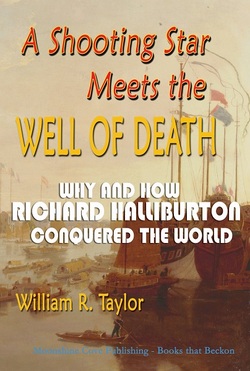
Incredible Adventurer/traveler/author Richard Halliburton burst upon the literary scene in the middle 1920’s with his first best-selling book, “The Royal Road to Romance.” It was a fresh, incredibly exciting romp around the world for a recent Princeton grad whose headlong celebration of Youth, love of beauty, architecture, poetry, art. geography and history exploded from every page and captured the imaginations of armchair travelers throughout the world. He followed up on that success with six more adventure/travel best-sellers before his dramatic death in 1939.
Young Halliburton was many things to many people. To some he was an extremely brave and daring adventurer who pulled off unique feats such as; leaping into the Maya Well of Death twice, being the first to climb Fujiyama alone in the winter, swimming the length of the Panama Canal while dodging alligators and barracudas, risking nights with Devils Island prisoners to record their tragic stories, plus engineering countless other off-the-wall exploits. To others he was a showman who toyed with the gullibility of armchair travelers to enrich himself and feed his craving for self-glorification.

Members of the Press began showing their distaste for his showmanship early in his career while he was adventuring in the Mediterranean gathering material for his second book. In an effort to generate publicity he faked his own drowning but botched the attempt badly, causing him to be a frequent target for the rest of his short life whenever he pulled off something out of the ordinary such as riding an elephant over the Alps to emulate Hannibal.

Moye Stephens, the respected aviation pioneer who flew around the world in an open cockpit, two-winged plane with Halliburton for eighteen months in 1930-31 and became his loyal lifetime friend candidly related that the author on occasion stretched the truth. But at the same time as he deflated some of Halliburton’s embellished tales about the trip Stephens lauded him for his extraordinary courage and pointed out that the vast majority of his stories about events they experienced were genuine and had happened just as Halliburton described them.
Richard’s father, Wesley, who was his sometime editor and full time defender, also commented that his son sometimes threw a bit of “red paint” on his narratives to make them sound more dramatic and exciting but, like Stephens, he pointed to the originality and daring of his son’s many genuine adventures as a sort of compensation.
For the most part Halliburton ignored the ridicule of the Press over the years but he deeply resented their wholesale labeling of all his adventures as bogus. He finally lost his cool and struck back at those critics in a 1937 Sunday newspaper supplement in which he categorically countered the charges of exaggeration for many of his most memorable feats.
Richard’s father, Wesley, who was his sometime editor and full time defender, also commented that his son sometimes threw a bit of “red paint” on his narratives to make them sound more dramatic and exciting but, like Stephens, he pointed to the originality and daring of his son’s many genuine adventures as a sort of compensation.
For the most part Halliburton ignored the ridicule of the Press over the years but he deeply resented their wholesale labeling of all his adventures as bogus. He finally lost his cool and struck back at those critics in a 1937 Sunday newspaper supplement in which he categorically countered the charges of exaggeration for many of his most memorable feats.

In my biography of Halliburton, “A Shooting Star Meets the Well of Death, Why and How Richard Halliburton Conquered the World,” I quoted many details of his article in a whole chapter in which I scrutinized his spirited defense.
I found his protests were logical and convincing but because he put them to print so long after the fact they probably didn’t alter the opinions of many of his critics. In my view it was unfortunate that he had to make this public defense of his claims at all, considering that he accomplished so many feats of considerable consequence. I summed up my feeling of regret this way in my book:
“But even his most ardent supporters would have to admit there were occasions when Halliburton was selectively objective when he wrote about his experiences. For a man whose life was chock-full of legitimate feats of daring and courageous accomplishments, his occasional inventiveness is unfortunate because it caused the line between fiction and reality as he reported it to always be blurred.”
I found his protests were logical and convincing but because he put them to print so long after the fact they probably didn’t alter the opinions of many of his critics. In my view it was unfortunate that he had to make this public defense of his claims at all, considering that he accomplished so many feats of considerable consequence. I summed up my feeling of regret this way in my book:
“But even his most ardent supporters would have to admit there were occasions when Halliburton was selectively objective when he wrote about his experiences. For a man whose life was chock-full of legitimate feats of daring and courageous accomplishments, his occasional inventiveness is unfortunate because it caused the line between fiction and reality as he reported it to always be blurred.”

What do you think? Was Halliburton an opportunistic showman out to bilk his millions of followers or was he just “guilty” of being too exuberant in tossing too much red paint on otherwise genuinely thrilling adventures to make them even more entertaining?
William R. Taylor, author.
William R. Taylor, author.
 RSS Feed
RSS Feed